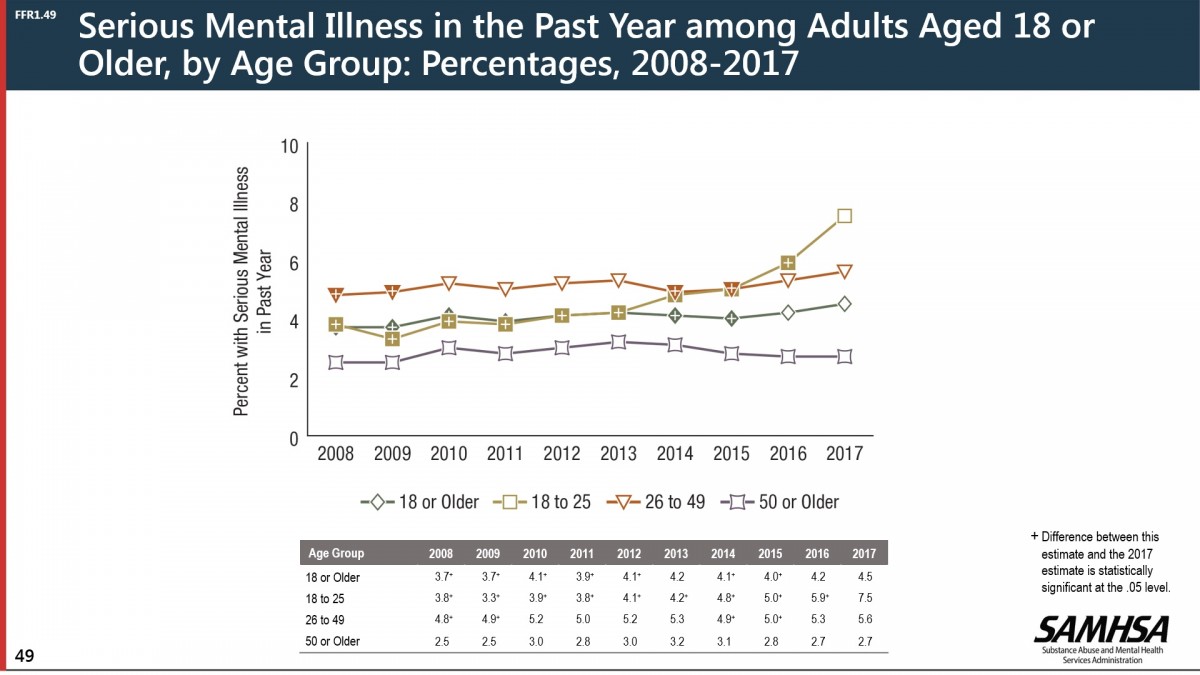Leaders of the Parents Movement of the late 1970s and 1980s feared their children’s pot use led to apathy, lower grades and other drugs. The old concerns remain, but the new anti-pot Parents Movement warns more about the fact that marijuana may lead to severe forms of mental illness. A new study confirms that teen marijuana use increases depression and the risk for suicide in young adulthood.
According to the study, the odds of developing depression are 37% higher in young adults up to age 32 who used marijuana as teens, compared to those who did not. The odds of a young adult thinking about suicide were 50% higher in those who smoked pot as teens. The odds of a suicide attempt were almost 3.5 times higher in the pot smokers versus those who didn’t use marijuana.
Researchers from University of Oxford and McGill University conducted a meta analysis of multiple studies over the last 15 years. The purpose was to estimate the association between pot use as a teen and mental health in adulthood. Professor Cipriani of Oxford explained: “We carefully selected the best studies carried out since 1993 and included only the methodologically sound ones to rule out important confounding factors, such us premorbid depression.”
The study does not account for the amount and potency of the marijuana, or for factors such as trauma, genetics, other drugs. However, it’s clear that avoiding marijuana may help prevent future mental health issues.
Huge increase in mental health issues for 18-25 year-olds
Because of the warnings (from Poppot, SAM, Smart Colorado and other groups) have been issuing since 2014, some young people may be delaying their pot use. We’re still concerned that too many 18-25-year-olds begin marijuana use, convinced they’re no longer vulnerable to adverse mental health effects. In the US, there’s a huge increase in Severe Mental Illness (SMI) for ages 18 to 25, according to the National Survey of Drug Use and Health for 2016-2017.

Delaying initiation of pot use until ages 18 and over does not mean that the older age groups are immune. Negative impacts may arise, as the brain keeps developing until the mid-to-late twenties. In addition to Serious Mental Health Disorders (shown above) NSDUH survey showed that 18-25-year-olds have more mental health disorders than any other age group, 22% in 2016, and 25% in 2017.
That figure steadily increased from 18.8 % in 2008. By comparison, 13.8 % of those 50 and older had any mental illness in 2017, a slight dip from 2008, when the economy tanked.
What’s even worse is that 7.5% of 18-25-year-olds have severe mental health disorders, such as schizophrenia, bipolar I or severe depression. This figure doubled in nine years, rising from 3.8% to 7.5%. In real numbers, it’s serious. In 2017, 2.6 million young adult Americans had a serious mental health issue, up from 1.2 million 18-25-year-olds in 2008. Alex Berenson, author, pointed to this problem in Tell Your Children the truth about marijuana, mental illness and violence.
(For other age groups, the rates of mental illness have remained flat. Only 7.9 % of people over age 26 use marijuana in 2017, while over 20% of 18-25-year-olds use pot. )
SAMHSA talk to preventionists
Dr. Elinore McCance-Katz, Assistant Secretary of Health and Human Services for Mental Health and Substance Use, addressed 2,500 prevention workers. Her recent talk on February 4 covered “emerging and urgent issues in substance use prevention.” Dr. McCance-Katz confirmed many things we’ve been trying to say. She emphasized that people are not making informed choices about marijuana, because they don’t have good information.
Dr. McCance-Katz’s slides showed that young marijuana users also have higher percentages of alcohol use and opioid misuse.
Past warnings about adverse mental health outcomes
Doctors on our Advisory Board have warned of the growing number of suicides in Colorado and that marijuana is the drug most often found in toxicology of teen suicides. The number one cause of death in Colorado ages 10 to 24 is suicides, and the number one drug they are testing positive for ages 10 to 19 is marijuana!
In 2014, Lancet Psychiatry published research showing that teens who were daily users of marijuana between ages 13 and 17 were 7 times more likely to have attempted suicide by age 30. It was a shocking revelation.
The 2019 study on the risk of depression (see first paragraph) did not find a connection between past teen marijuana use and anxiety in adulthood. However, we find many teens use marijuana to cope with anxiety. When they’re not using marijuana, anxiety increases and they develop withdrawal symptoms. Often teens use marijuana and Xanax together.
Other risks suggest abstention is only good option
For both teens and adults, any comfort that comes from substance use or abuse may transform into worse long-term outcomes. Depression is a risk, as well as psychosis and psychotic disorders. Genes, developmental trauma and the many challenges of life may also be involved in the development of depression or psychosis.
While different people respond differently to marijuana, the science hasn’t figured how and why some people have more extreme outcomes than others. The damage is greatest the younger a person uses, although marijuana is most commonly used by ages 15-25. To protect your brain, complete abstention from marijuana is the only option for children, teens and young adults.
In the world of celebrities, consider Carrie Fisher, who began using pot at 13, suffered from bipolar disorder and died at 61. Amanda Bynes and Pete Davidson toked in their teens, compromising their mental health, although Bynes recently recovered.
According to National Institute of Mental Health, about 44 million adults in the US has a diagnosable mental illness, excluding developmental and substance use disorders. Life is tough and challenging anyways, so why add to the problems by using pot? A doctor who says drinking is bad, but pot’s ok does not know the science. Any therapist or counselor who tells parents not to be concerned about your teen’s pot use is misinformed.

